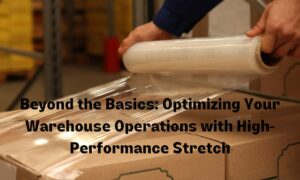In the evolving world of logistics, the yard plays a pivotal yet often overlooked role. While warehouses and transportation get the bulk of attention, the yard serves as the critical link that connects inbound and outbound movements. Without efficient yard operations, even the most advanced warehouse systems or optimized transportation schedules can fall short. Yard management solutions are designed to address this need—improving visibility, minimizing delays, and ensuring trailers, containers, and personnel are in the right place at the right time.
As businesses strive for more streamlined supply chain operations, yard management solutions (YMS) are no longer optional. They are a key component in enabling end-to-end efficiency, cost savings, and better service performance.
Bridging the Gap Between Transportation and Warehouse Operations
The yard is where goods transition from transportation networks to warehouse floors. This interface is prone to inefficiencies when it lacks coordination. Trucks can arrive late, trailers might remain idle for too long, or dock doors can be underutilized. Yard management solutions help bridge this gap by aligning transport schedules with warehouse availability and yard capacity.
With a centralized system managing trailer arrivals, gate check-ins, and dock assignments, logistics teams can avoid bottlenecks that disrupt the supply chain flow. This alignment supports faster turnaround times, improves warehouse throughput, and ensures that transportation assets are efficiently used.
Real-Time Visibility and Tracking
A major benefit of yard management solutions is the visibility they offer. YMS platforms provide real-time updates on trailer status, location, and assigned tasks. This visibility extends beyond just physical assets—it includes driver movements, available docks, and gate queues.
Knowing where every trailer is at any given moment enables better decision-making. Logistics coordinators can proactively assign tasks, anticipate delays, and reroute resources when necessary. Visibility also enhances collaboration between yard personnel, warehouse teams, and transportation providers, improving communication and response times.
Automated Gate Management
Yard entry and exit points are natural chokepoints. Manual gate processes can lead to long wait times, inefficient check-ins, and errors in documentation. Yard management systems automate gate operations to streamline this critical step.
With tools like license plate recognition, RFID tags, and digital check-in systems, drivers can be processed quickly and securely. Automated gate management also records each trailer’s entry and exit, improving accuracy in yard inventory. This system reduces administrative burdens and ensures consistent access control, enhancing both efficiency and security.
Efficient Dock Scheduling and Utilization
Docks are limited and valuable resources in any yard. Uncoordinated scheduling can lead to underused docks or missed loading windows. A YMS enables optimized dock scheduling by matching trailer arrivals with dock availability and labor capacity.
By forecasting demand and balancing loads across all available docks, yard managers can maximize dock usage and reduce idle time for trailers and crews. Smart scheduling also prevents overloading specific docks, helping avoid delays and wear on loading infrastructure.
Improved Yard Jockey and Spotting Operations
Yard jockeys and spotters play a crucial role in moving trailers to and from docks. Without a structured plan or tracking system, their time can be wasted on inefficient routing or uncoordinated moves. Yard management solutions assign and track yard tasks based on real-time priorities.
With digital task lists, mobile alerts, and updated trailer maps, jockeys can complete more moves in less time while avoiding unnecessary movements. This not only improves their productivity but also accelerates freight movement and reduces congestion in the yard.
Data-Driven Decision Making
Another significant advantage of yard management solutions is the data they collect. From tracking trailer dwell times to measuring dock throughput, YMS platforms generate a wealth of operational data. This data allows logistics managers to analyze performance, identify trends, and uncover areas for improvement.
For example, if certain docks consistently have longer load times, it may indicate a labor allocation issue or an opportunity for process improvement. Similarly, high trailer dwell times might suggest problems with warehouse flow or inbound scheduling. These insights are vital for continuous improvement efforts across the supply chain.
Reducing Detention Costs and Improving Carrier Relations
Delays in trailer unloading or loading not only slow down operations but can also result in detention charges from carriers. Yard management solutions help minimize these costs by ensuring fast, organized trailer handling.
With better scheduling, task prioritization, and yard traffic flow, trailers spend less time waiting. Carriers benefit from quicker turnaround times, leading to improved relationships and potential cost savings through better-negotiated agreements.
Supporting Compliance and Safety
Compliance with safety regulations is non-negotiable in logistics operations. Yard management systems contribute to safety by enforcing structured workflows and automating compliance documentation. This includes tracking trailer inspections, validating driver credentials, and maintaining digital records of gate entries and exits.
In addition, better task organization and visibility help reduce unsafe conditions caused by overcrowding, miscommunication, or rushed operations. With clearly defined tasks and efficient trailer movement, the yard becomes a safer working environment for drivers, spotters, and warehouse personnel.
Scalability for Growing Operations
One of the strengths of modern yard management solutions is their scalability. As supply chains expand, more trailers, docks, and personnel are involved, increasing the complexity of yard operations. A manual approach cannot keep up with such growth.
YMS platforms are designed to scale with business needs. Whether managing a single distribution center or a network of logistics yards, the system can adapt to handle larger volumes and more intricate scheduling requirements. This scalability ensures long-term value and continuity of operations, even during seasonal surges or business expansion.
Integration with Supply Chain Technology
Yard management solutions are most powerful when integrated with other systems such as warehouse management systems (WMS), transportation management systems (TMS), and enterprise resource planning (ERP) platforms. These integrations allow seamless information sharing across the entire supply chain ecosystem.
For instance, a shipment status update from the TMS can automatically trigger a dock appointment in the YMS. Similarly, warehouse availability data from the WMS can be used to schedule trailer unloading in real time. This synchronization reduces manual work, shortens lead times, and improves overall operational coherence.
Conclusion
Yard management solutions are essential tools for maintaining a consistent, efficient, and visible flow within supply chains. By improving how trailers are scheduled, tracked, and handled, these systems eliminate common bottlenecks and enhance coordination across warehousing and transportation.
In an industry where time, space, and information are invaluable, YMS platforms provide the control needed to keep operations running smoothly. From streamlining gate check-ins to enhancing dock scheduling and enabling data-driven decision-making, yard management solutions play a crucial role in supporting the larger goals of supply chain efficiency and responsiveness.



































